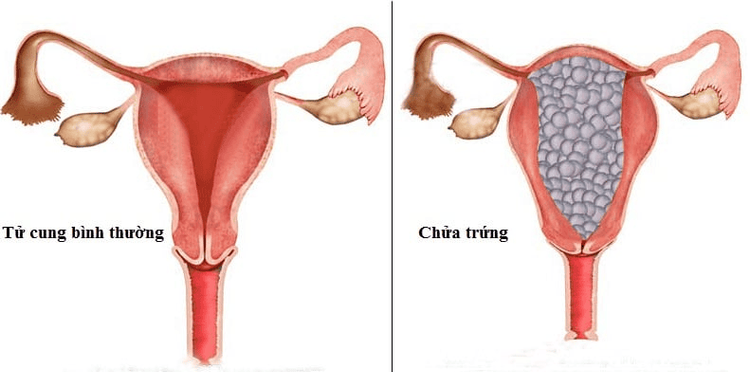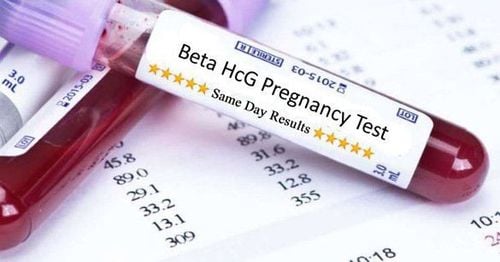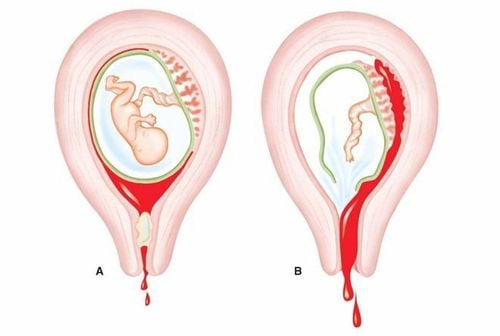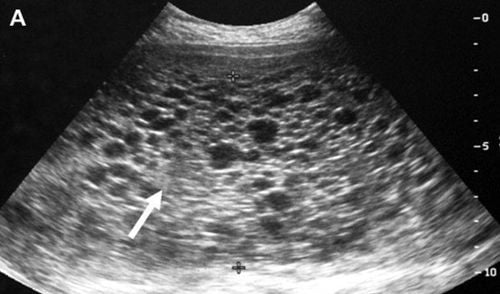This is an automatically translated article.
Professional consultation article by Doctor Department of Obstetrics and Gynecology, Vinmec Hai Phong International General Hospital.
Ovarian pregnancy (egg pregnancy) is a benign disease but can occur invasive or cancerous cells, directly threatening the patient's life.
1. What is egg pregnancy?
Egg pregnancy is a condition in which the cell layer in the placenta develops abnormally, turning into many small sacs filled with water inside, shaped like a bunch of grapes. These sacs of water are connected to each other by small fibers, overwhelming the fetus.

2. How does an egg pregnancy happen?
Normally, after sexual intercourse, sperm will find the ovum to become a fertilized egg and then develop into a fetus, including the placenta and amniotic sac.
Ovarian pregnancy is a condition in which the trophoblastic cells grow too quickly, causing the capillaries of the umbilical blood vessels at the placenta and connective tissue not to develop in time. These placental spines are degraded, edematous into small sacs containing fluid inside and are attached to each other from a connective string like a bunch of grapes. These sacs range in diameter from 1mn to several tens of millimeters, occupying a large space in the uterine cavity.
Fetuses are divided into two types:
Whole eggs: Eggs develop in a mass, without an embryo; Partial ovum: An egg with an abnormal embryo.
3. Causes of ovulatory disease
Currently, it is still not determined exactly what causes ovulatory disease. Factors thought to increase the risk of the disease include:
Women over the age of 35; Women who have given birth multiple times; People with weak health, lack of protein, vitamin A; People with a weak immune system.
4. Signs of pregnancy

People with egg pregnancy have typical signs of bleeding. Bleeding occurs a few days after a missed period. Usually the blood is dark, thin; lasts for many days, the amount may be less or more depending on the patient. In addition, the patient also had severe morning sickness, nausea, vomiting a lot. People are tired, pale, may have edema.
In the early stages of pregnancy, patients are easily misdiagnosed as threatened miscarriage. May increase blood pressure, proteinuria. About 50% of patients have an enlarged uterus rapidly for gestational age.
In the middle of pregnancy, the fetus is not palpable and the fetal heartbeat is not heard.
Patients with total ovum will mostly have iron deficiency anemia, have symptoms of pre-eclampsia, hyperthyroidism, heart palpitations, shaking hands...
When ultrasound will see images in the uterine cavity blizzard and no fetus. In addition to ultrasound, the patient will be assigned to do a beta hCG test to be able to accurately diagnose the disease.
5. Treatment of pregnancy
The patient needs to remove the egg mass from the uterus to prevent pregnancy complications. The method of treatment for ectopic pregnancy is dilatation or aspiration curettage.
In case the patients are elderly, no longer want to have a baby or the invasive egg pregnancy causes a perforation of the uterus, it is possible to have a hysterectomy with the whole egg mass or a hysterectomy after the egg has been removed. .

6. Complications of pregnancy
Pregnancy is a benign disease, but if not treated early, it will easily lead to dangerous complications such as:
Blood loss; Malnutrition; Haemorrhage; Invasive pregnancy ; Stem cell cancer. About 80% of cases after abortion will have good progress. The remaining about 20% of the trophoblasts continue to grow and lead to the above complications.
7. Follow-up after treatment of oocyte pregnancy
After abortion, the patient needs to be closely monitored to prevent dangerous complications. Patients need to monitor beta hCG after about 2 weeks of oocyte retrieval. Perform routine testing every two weeks for the first 3 months and then every month after that until the end of 12 months.
Note: It is necessary to use contraceptive methods within 1 year after aspiration abortion.
8. When can I get pregnant again?
After treatment, women need to wait about 1 year for beta hCG levels to return to normal before becoming pregnant again. After getting pregnant again, it is advisable to have regular ultrasounds during the first 3 months to make sure there are no abnormalities.
For more information, please contact Vinmec Hospitals and clinics nationwide
Please dial HOTLINE for more information or register for an appointment HERE. Download MyVinmec app to make appointments faster and to manage your bookings easily.













